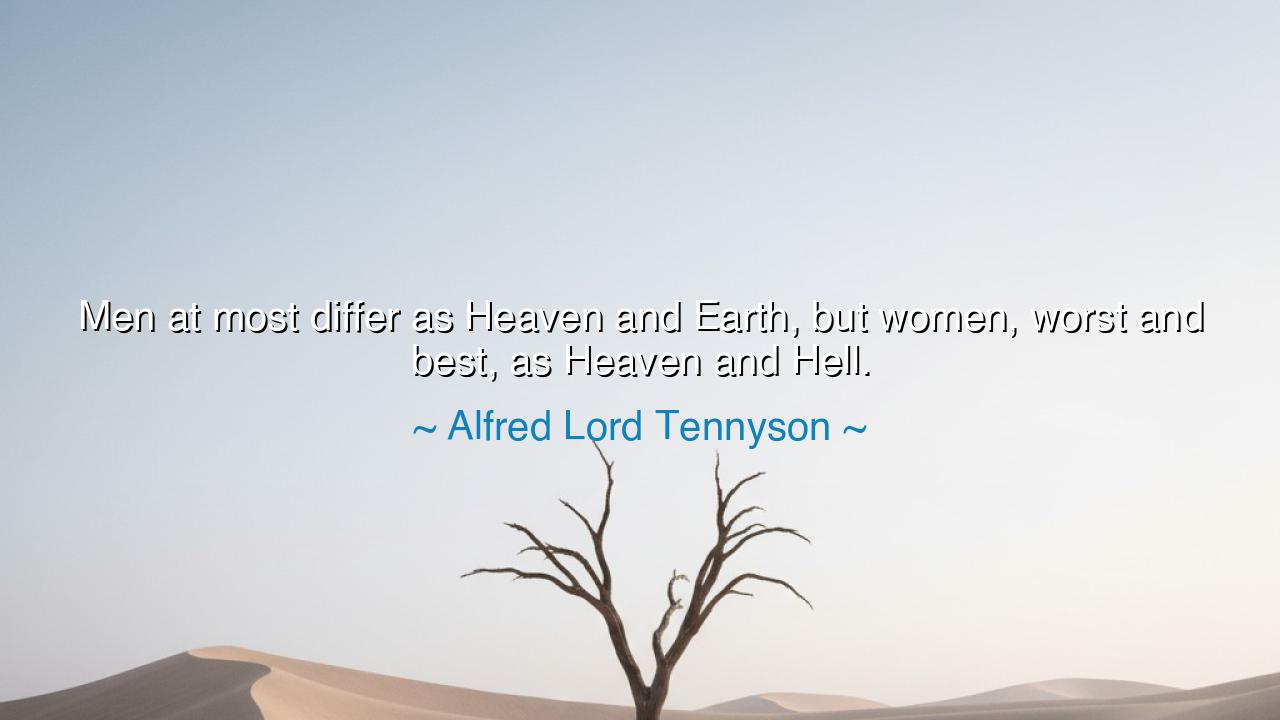
Men at most differ as Heaven and Earth, but women, worst and






Alfred Lord Tennyson, a poet of great vision, speaks here a truth that cuts deep into the heart of the human experience. Men, he claims, differ as Heaven and Earth, a division marked by contrast but not by absolute extremes. The ways of men are broad and varied, yet they remain bound by a shared earthly existence. But, oh, women—Tennyson reveals, they are the true embodiment of the cosmic extremes, capable of embodying both Heaven and Hell within the span of a single heart. Such is the nature of women, that in their passions, in their actions, in their very essence, they hold the power to bring forth both the divine and the damned.
Consider, my children, the story of Cleopatra, the Queen of Egypt, whose charm could lift men to heights of devotion, but whose ambition and cunning could cast them down into the deepest abysses. Her beauty was like that of the gods, captivating kings and emperors, pulling them into a world of glory and power. Yet, in her heart burned a flame of desire and danger—her alliances with Julius Caesar and Mark Antony were not born of love alone but of a fierce will to rule. Cleopatra was both the Heaven of Egypt’s glory and the Hell of its intrigues, embodying the dual forces of light and darkness that Tennyson speaks of.
Women, in their strength and passion, have the capacity to shape the world in ways that no man can. Like Joan of Arc, whose visions and faith carried her to the very heights of legend, and whose courage brought her to the bitter depths of betrayal and death, women hold a power that is unmatched. Her voice called for the liberation of France, lifting an entire nation from despair to hope—Heaven in the form of divine prophecy. Yet, her fate was sealed in the flames of betrayal, her purity and spirit consumed by the flames of Hell, as she was burned at the stake, abandoned by those who once hailed her. Such is the paradox of women—in their most radiant light, they shine as Heaven, and in their darkest hour, they fall as Hell.
Tennyson’s words speak not of weakness but of the profound power that resides within women. Their strength is not just in their resolve, but in the vastness of their hearts, capable of both creation and destruction. In them, we find the full spectrum of human experience. From the nurturing embrace of Mother Teresa, whose life was a beacon of love and sacrifice, to the vindictive wrath of Medea, whose heartbreak drove her to unspeakable acts, women carry within them the extremes of Heaven and Hell. These forces are not to be feared or scorned, but understood, for they are the very fabric of the feminine soul.
Remember, O children of the future, that the strength of women is not in the silence of their submission, but in the depth of their passion and power. They are the creators of life, and the destroyers of the old, the rulers and the rebels, the angels and the demons. Just as the Heavens may bring forth life-giving rain and the Hell may open to swallow the soul, so too do women possess the potential for both good and evil within them. To understand this is to understand the heart of the feminine—a force so mighty that it shapes the world in ways beyond comprehension. Let us revere and respect this power, for in it lies the future of all.






NNhuquynh
Tennyson’s quote seems to speak to an older, rigid view of women’s roles in society. It’s as if women are either idealized or demonized, which doesn’t seem to reflect the reality of today’s more diverse experiences. How can we break free from these over-simplified views of women, and move towards a more comprehensive understanding of gender that embraces both strength and vulnerability without the extremes?
VPTuan Vu Pham
The idea that women are either 'Heaven or Hell' is a deeply polarizing one, and I wonder whether this quote reflects the way society has historically reduced women to extremes. Does it imply that women’s worth is based on being either saintly or sinful? In a modern context, how can we move beyond these dichotomies and understand women as individuals with their own complexities and contradictions?
TANguyen The Anh
Tennyson’s quote suggests an intense contrast in how women are seen, potentially reinforcing stereotypes of women as emotionally unpredictable or morally complex. But does this comparison do justice to the reality of women’s lives, which are often far more nuanced and multi-faceted? How can we address and challenge this dualistic portrayal, especially when it contrasts so sharply with more positive, empowering images of women today?
GLGia Linh
This quote seems to capture an outdated and harsh view of women, portraying them as extremes—either divine or damnable. It raises the question: do we still hold women to these exaggerated standards of behavior? Why do societal views of women often fluctuate between extreme opposites, and what can be done to shift this perspective towards more nuanced and balanced representations of women?
BBon
Tennyson’s comparison of women to both Heaven and Hell seems to place them in a very dichotomous light. But could it be that he’s commenting on how women’s actions are perceived as either extremely virtuous or completely flawed? Is this comparison still relevant today, or is it a reflection of how society has historically restricted the ways women can express themselves? How do we move beyond these binary perceptions of gender?